|
|
As we continue to navigate the COVID-19 pandemic, I know many of you have questions. I will continue to compile helpful resources and share them on buddycarter.house.gov/coronavirus. Click here for important information for small businesses, individuals, seniors, medical professionals, veterans, parents, teachers and more.
We discuss the coronavirus, federal response, and the need to follow the advice of local officials and health care professionals on this week's edition of Buddy's Briefing. Click here to watch the latest episode.
|
| Coronavirus is a wake-up call for America's pharmaceutical independence |
|
|
In case you missed it, I wrote an op-ed in Fox News this week on the need for pharmaceutical independence. We cannot continue to be dependent on foreign markets like China and India for life saving medications. Click here to read more.
Coronavirus is a wake-up call for America's pharmaceutical independence
President Trump has said we are fighting an “unseen enemy” right now, and he is right. The coronavirus COVID-19 pandemic has swept the world with countries, including the United States, taking unprecedented steps to protect their citizens and slow the spread of the virus.
This pandemic is also an important wake-up call. It has shown that the pharmaceutical supply chain has shifted in recent decades to predominantly producing a variety of products in Asia, including finished medications and active pharmaceutical ingredients (APIs).
Many drugs that have been around for decades, such as ibuprofen and penicillin, began production overseas at the expense of domestic production here in the United States. It’s estimated that 90 percent of antibiotics, vitamins and pain relievers – drugs that Americans take every single day – come from China. As a pharmacist for more than 30 years and currently the only pharmacist serving in Congress, I know firsthand that we cannot allow this foreign dependence to continue because a disruption in the supply chain or a shortage of drugs could be devastating for every day Americans – and we are facing that reality today.
Chinese state media has made recent overtures that they may prioritize utilization in their own country rather than ship overseas to countries like the United States. And in just the past few weeks, India announced that they would be withholding exports of API products overseas – 26 in total – posing a severe risk to American consumers that desperately need these drugs.
It is abundantly clear that the U.S. has a significant vulnerability when it comes to the production of APIs and other drugs in foreign markets.
While U.S. drug companies still lead the world in the development of cutting-edge pharmaceutical products, we’ve fallen behind on the production of basic drugs and ingredients. India is the number one producer of generic drugs in the world – supplying 18 percent of the world’s generic medicines. But even India relies on China, with 70 percent of the APIs used to manufacture medicine in India coming from China.
We are not just seeing larger percentages of the ingredients needed for production being made overseas. The United States doesn’t even have a firm grasp on how much is actually produced abroad for the supply chain.
In October, Janet Woodcock, the director for the Center of Drug Evaluation and Research, testified before me and my colleagues on the Health Subcommittee of the House Energy and Commerce Committee. She explained that while there was an acknowledgment that a majority of API production is done abroad, we don’t have an accurate assessment of those products and how much is now done overseas. Estimates predict this number could be upwards of 70 percent, and the number of FDA registered facilities making APIs in China has more than doubled in the last decade. It’s also alarming that in addition to not knowing how much is actually produced in China, we also don’t know where it’s being distributed.
Much like the oil embargoes of the 1970s when America realized we needed to become energy independent, we now need to focus on pharmaceutical independence. We cannot afford to have the United States beholden to foreign production and interests, especially when it comes to something like life-saving medications. This is not only about health care. It’s also about our national security.
First, we must have an accurate assessment done so that we know how much of our pharmaceutical needs are produced overseas, especially APIs. Without that data, we cannot properly prepare.
Second, we have to look at how we can transition this production back to the United States. My office is currently working on policies that will help increase domestic production through incentives, updated manufacturing policies, and tax relief. The federal government needs to create an environment that brings drug manufacturing back to American soil. While doing this, it’s important that we learn from our past mistakes – like when we saw extreme abuse of incentives for pharmaceutical manufacturers to relocate to American territories.
Third, we need to maximize all available outlets, including compounding pharmacists. As we experience national shortages of basic sanitary products like hand sanitizer, they can play a larger role in helping to meet those needs. I have successfully worked with the Food and Drug Administration to allow compounding pharmacists to produce hand sanitizer during the pandemic when they are usually banned from making “commercially available” products. These health care professionals are here in America and they are able to help meet the health care demands of American consumers. They should be allowed to do it.
Finally, we need to continue exploring advanced manufacturing techniques where necessary. We must utilize advanced technologies like mobile manufacturing facilities. If we have the ability to deploy the manufacturing of needed treatments to hot spots, we can more effectively save lives.
President Trump has made clear that we need to focus on America first. I can think of no more important "America first" mission than achieving pharmaceutical independence. This will help us better prepare for the possibility of future pandemics, and it will ensure Americans are able to access the medications they need when this is all over and we return to our day-to-day lives. |
| from our nation's Capitol CCLX |
|
|
Monday, March 30, 2020: During these tumultuous times that we find ourselves in, I am amazed at how people in the First District have pulled together and offered support for each other. On Saturday, I stopped by the Feed the Hungry event in Garden City where State Representative Carl Gilliard, Garden City Mayor Don Bethune and a host of volunteers stepped up to help supply hundreds of people with food. The well-organized event is one of many food banks being held throughout the district during this pandemic and reminds all of us how important it is to look out for one another. Also, on Saturday, I had a conference call with other members of the Georgia Congressional delegation and Secretary of State Brad Raffensperger. After our daily all-staff conference call this morning, I have a phone interview with CNN to discuss the concerns lupus and rheumatoid arthritis patients who take hydroxychloroquine have about getting access to their medications due to limits and hoarding. Hydroxychloroquine is one of the drugs being studied now for its effectiveness in treating COVID-19 patients. Afterwards, I head to Brunswick High School in Glynn County where I help teachers, school personnel and volunteers hand out school lunches. One of our primary concerns in Congress when we were crafting the third phase of the coronavirus relief package, the Coronavirus Aid, Relief, and Economic Security (CARES) Act, was to make sure that the nutritional needs of our citizens, and particularly our students, are being met. A link to my volunteering at Brunswick High School can be found here.
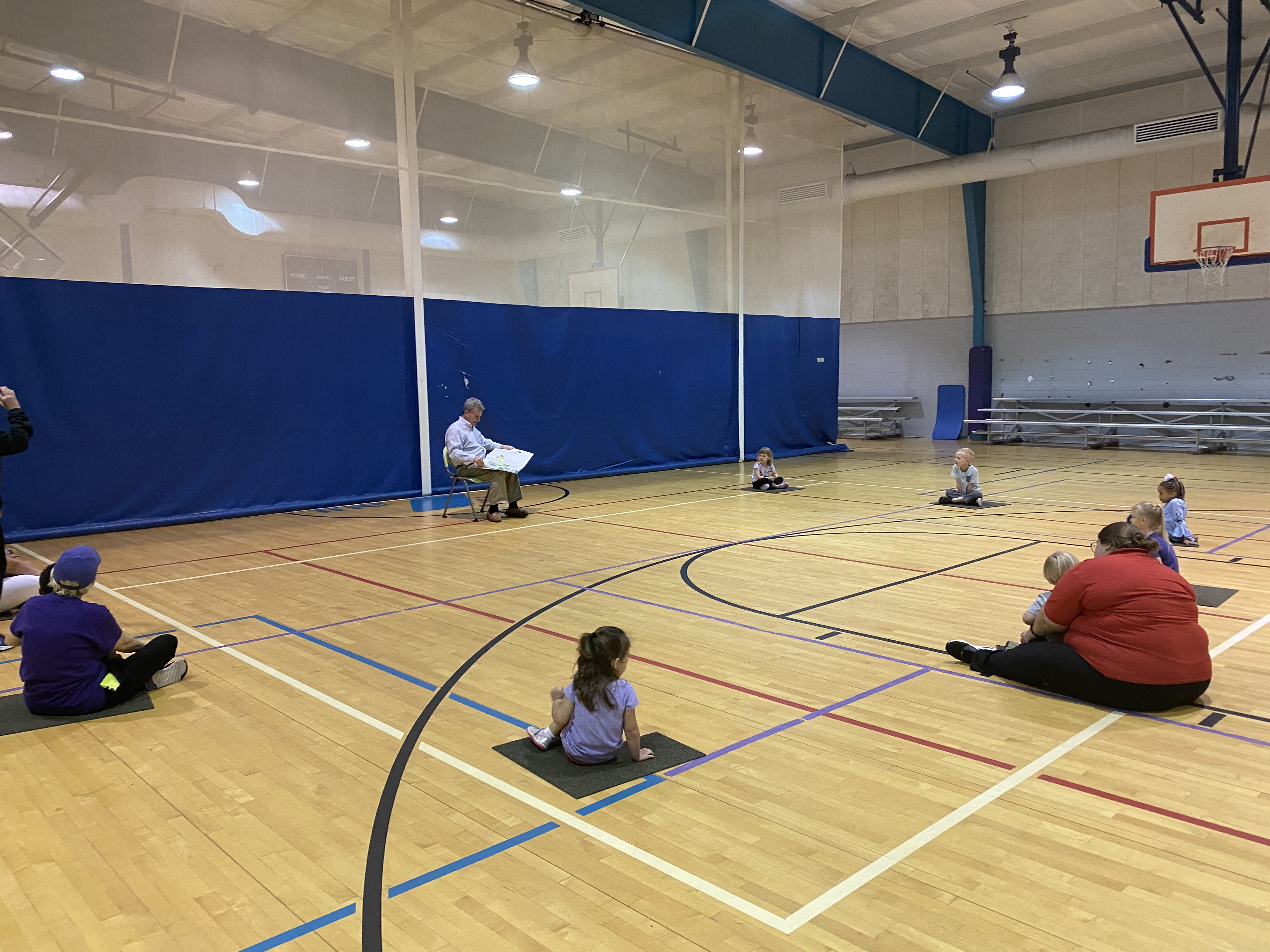
Rep. Carter reads to children at the YMCA |
Next, I head to the YMCA in Brunswick where I have the opportunity to read to the children of some of our heroes during this pandemic - doctors, nurses, first responders, police, etc.- who are at the daycare. Many of the YMCA’s across our state have opened their daycares to the children of these heroes while they fulfill their important duties during this pandemic. Afterwards, while heading back to our Savannah office, I have a phone conference with a pharmacy group to discuss a request to suspend certain regulations pertaining to pharmacy during the pandemic. Once at our Savannah office, I film a thank you video for our doctors, nurses, and other health care heroes during this pandemic. A link to my video can be found here. Next, I host a telephone town hall to discuss the coronavirus and have as my special guest, Dr. Lawton Davis, the District Health Director for the Coastal Health District with the Georgia Department of Public Health.
Tuesday, March 31, 2020: I’m in Hinesville at the United Way of Liberty County this morning as I join a great group of volunteers as we unload pallets of canned goods and store them for pickup by the community.
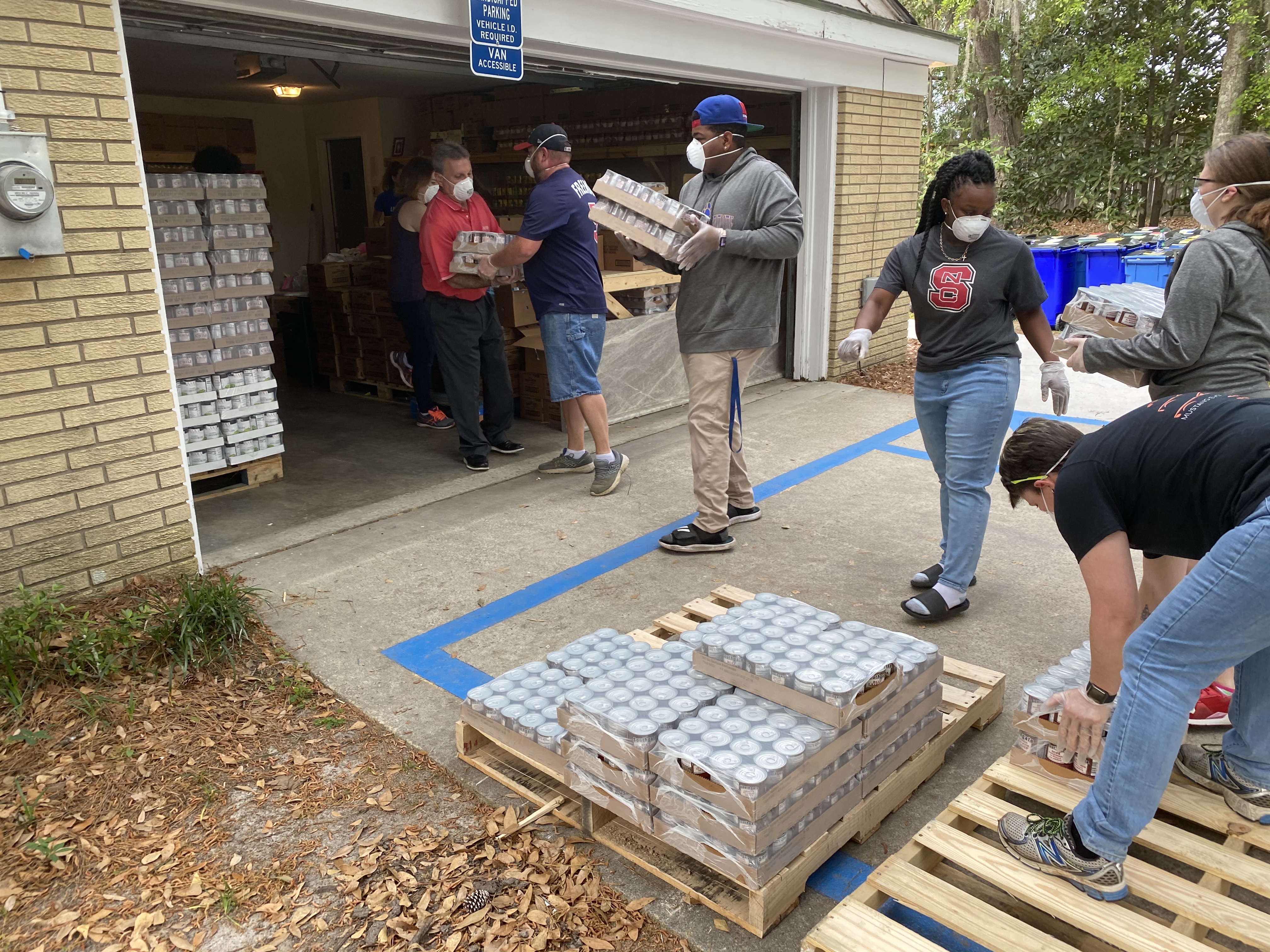
Rep. Carter with volunteers at United Way of Liberty County |
Afterwards, I head over to the Hinesville Police Department to film a thank you video detailing their work delivering prescriptions to high-risk individuals in the community. A link to my video can be found here. Next, I film a video reading the book Dragons Love Tacos 2 to be sent to students in Liberty County. A link to my video can be found here. After filming another video in downtown Hinesville, this time at Molly Maxine Boutique to highlight their shipping and curbside services, I head to our Savannah office where we have our daily all-staff conference call followed by a conference call with the Automotive Service Association where I bring them up to date with details of phase 3 of the coronavirus relief package. My next conference call is with the House Energy Action Team (HEAT) where we hear from Frank Fannon, Assistant Secretary for the Bureau of Energy Resources at the State Department. Although overshadowed by the world coronavirus pandemic, currently Saudi Arabia and Russia are engaged in an oil price war that has triggered a major fall in the price of oil. Our call today focuses on the state of crude oil markets and a report on diplomatic engagement with the two countries.
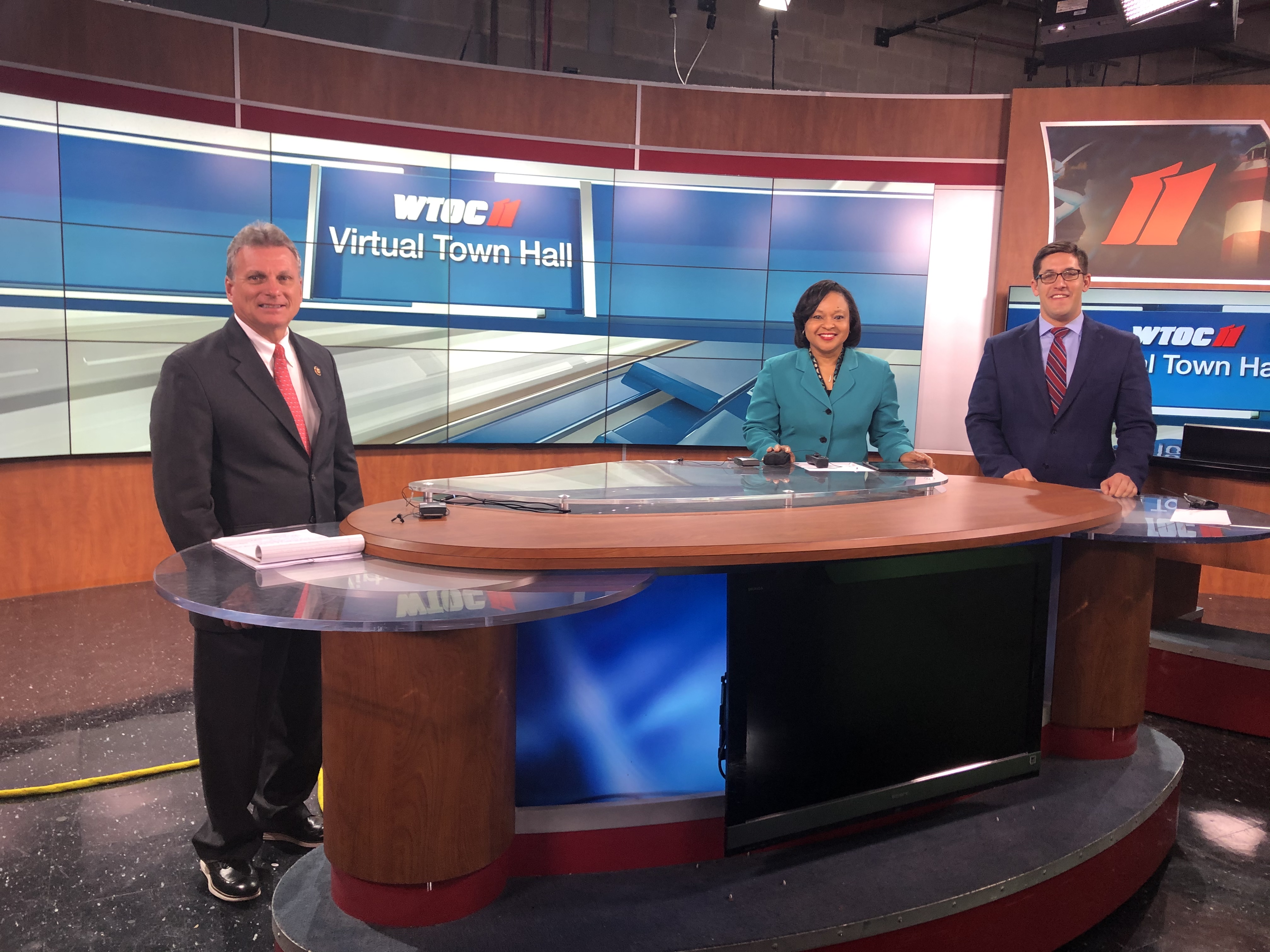
Rep. Carter participates in a virtual town hall on the coronavirus with WTOC |
Next, I have a conference call with the Georgia Research Environment Economic Network and later head to the studios of WTOC in Savannah where I participate in a virtual coronavirus town hall with anchor Dawn Baker. Links to the town hall can be found here.
Wednesday, April 1, 2020: After our daily all-staff conference call, I have a conference call with pharmacy groups to discuss ongoing conversations with the administration on how pharmacists can assist during the coronavirus pandemic. Next, I have a GOP Conference call where we discuss the latest news regarding the coronavirus before jumping on an Energy and Commerce (E&C) Committee conference call to discuss issues specific to the committee. Afterwards, I have a webinar with farmers throughout the state to discuss the Paycheck Protection Program (PPP), a new Small Business Administration (SBA) loan program created by Congress in the CARES Act. After a phone interview with WJCL TV in Savannah to discuss Community Development Block Grants for areas in the First District that we were able to secure, I record a video thanking Capitol Hill support staff for their continued work while we are away from Washington. Next, I have a Skype interview with One America News Network to discuss the CARES Act. A link to my interview can be found here. Later, I have a phone call with the Centers for Medicare and Medicaid Services (CMS) Administrator Seema Verma to discuss health care issues during the pandemic.
Thursday, April 2, 2020: After our daily all-staff conference call, I head to the Second Harvest Food Bank of Coastal Georgia in Savannah where I volunteer along with members of the Georgia Army National Guard as we pack boxes of food to be delivered throughout the area. I continue to be amazed by the goodwill of our citizens during this pandemic as throughout the district I witness neighbors helping neighbors.
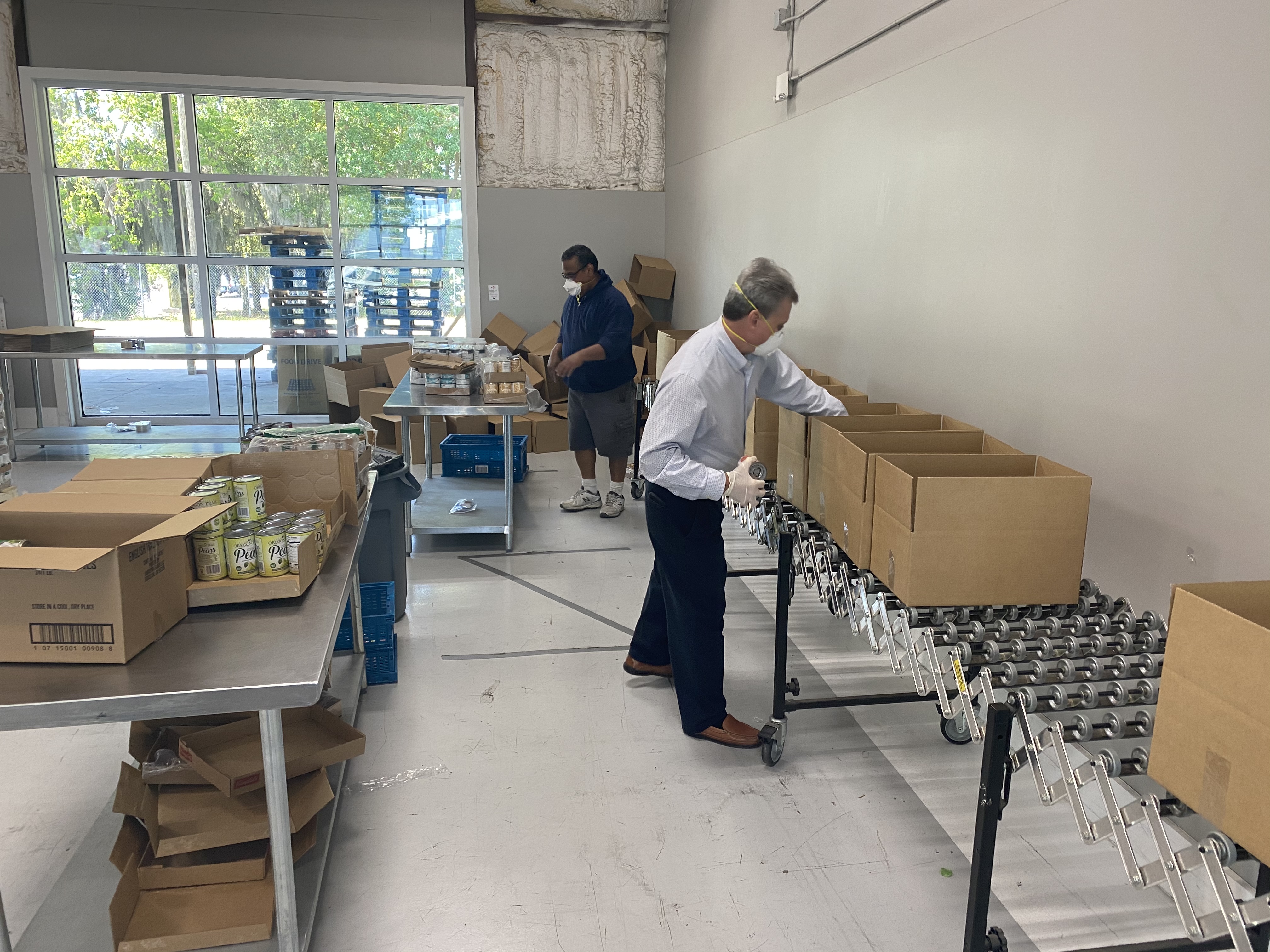
Rep. Carter at Second Harvest of Coastal Georgia |
The amount of food that Second Harvest provides our citizens and the consistency by which they provide it, especially during these most trying times, is simply amazing. Afterwards, I have a conference call with officials from the State Department to discuss their efforts to repatriate American citizens overseas back home. Later in the day, I have another HEAT Team meeting to learn of the progress being made in the Russia-Saudi Arabia oil battle, followed by a phone call with a representative from the agriculture community to discuss the decline in retail demand for many of our ag products.
Friday, April 3, 2020: After an early morning radio interview with my good friend Bill Edwards with NewsRadio 1290 in Savannah where we discuss the coronavirus situation as well as the CARES Act, I have another radio interview with another good friend, Scott Ryfun with Straight Talk Radio in Brunswick, to discuss the same subject matter. Afterwards, I head to UPS in Savannah to view their new facility and to thank them for their continued service during this pandemic.
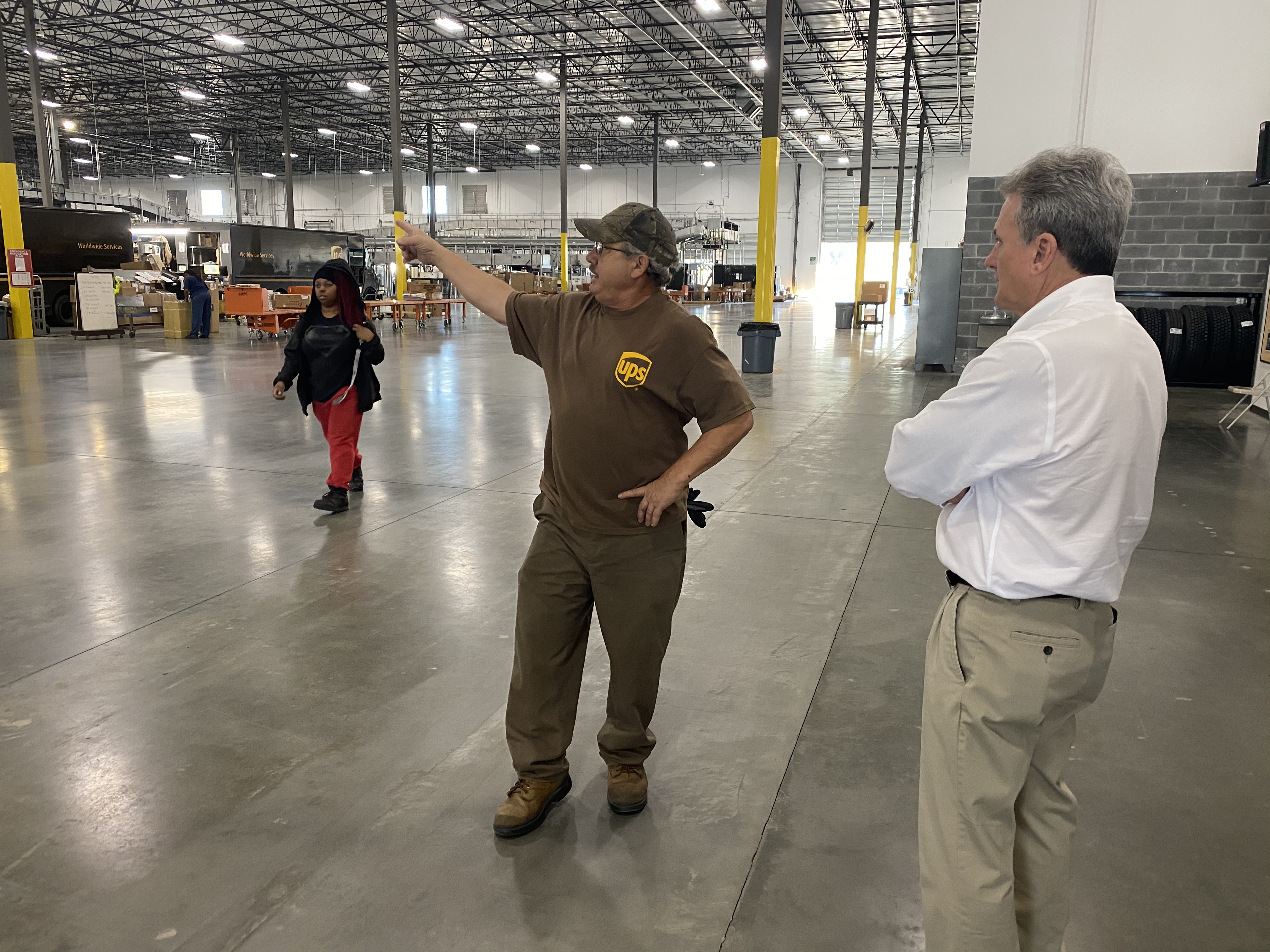
Rep. Carter thanking UPS employees for their work during the pandemic |
UPS and other delivery services are great examples of essential services that are often taken for granted but without whose support during these trying times we would be much worse off. Next, I have a conference call with Georgia Power for a southeast region business update with chambers of commerce and economic development agencies from the area. After a GOP Conference call, we have our daily all-staff conference call before I record a video for the Prescription Drug Abuse and Heroin Summit. Next, I head home where I film this week’s edition of Buddy’s Briefing and later have a member and staff call with the White House and Administration, including the Treasury Department, who bring us up to date on the roll out today of the PPP. My last conference call of the week is another HEAT Team call where we are brought up to date on developments from a White House oil executive meeting earlier today. |
|
|

